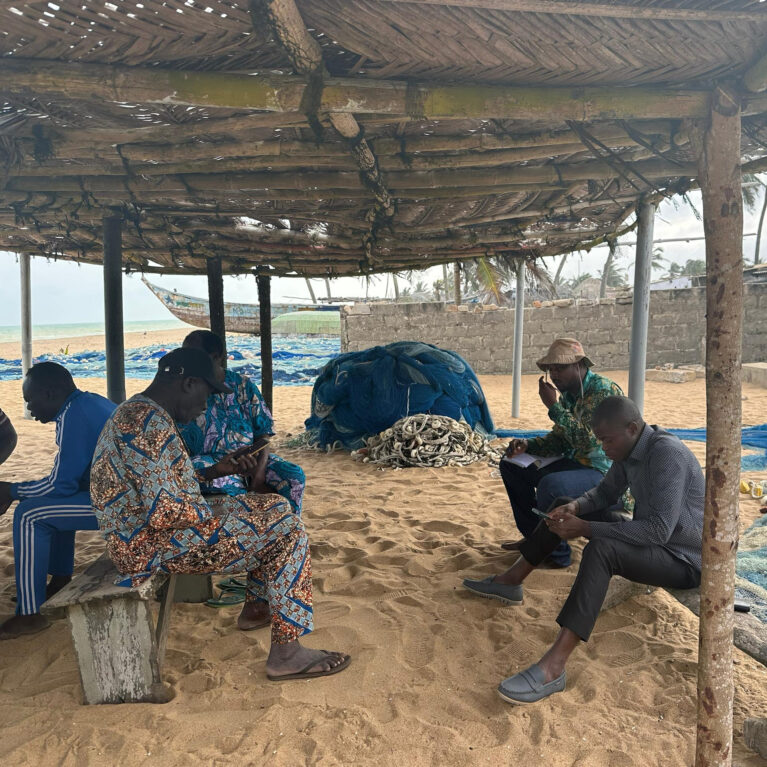Improving management of scalloped hammerhead shark fisheries in Benin
There is high demand for sharks in Benin and they form a key part of local fisheries, comprising as much as 90% of the marine fish that are consumed. But weak law enforcement does little to slow population declines and ensure sustainability in shark fisheries. Edéya is focusing on scalloped hammerhead sharks, but any interventions are also likely to benefit other shark species. By documenting catch data at the Cotonou Artisanal Fishing Harbour, mapping the market chain for this endangered species and training fishermen in safe shark release protocols, Edéya will pioneer improvement in shark fisheries practices in Benin.
As well as being the executive president of the Benin-based NGO Nature Ecologique (ECO-NATURE), I am a researcher and part-time lecturer affiliated to the research laboratory in aquaculture and aquatic ecotoxicology at the University of Parakou, Benin, and the Africa Centre of Excellence in Coastal Resilience at the University of Cape Coast, Ghana. I undertake applied research to investigate real and unaddressed problems identified in the fisheries sector and within fishing communities in order to provide science-based solutions or recommendations to decision-makers. Currently my main research subjects are fisheries science, sustainable aquaculture systems, aquatic ecosystems management and biodiversity...


Documenting catches, trade network and building stakeholder conservation capacity to save Sphyrna lewini in Benin
This project aims to provide accurate information about the catch pressure and trade in the Critically Endangered scalloped hammerhead shark and to develop the conservation skills of fishermen and fisheries managers in order to improve management practices and the conservation of the species in Benin.
In Benin, less attention has been given to protecting elasmobranchs than to the conservation of marine teleost fishes, even though elasmobranchs are also exploited by artisanal fishermen. A rare initiative focusing on sharks in Benin waters, this project aims to reduce fishing-related threats to the scalloped hammerhead and improve its conservation status. We will collect catch and trade data of the species to inform management decision-making and equip stakeholders with relevant skills to achieve conservation goals.
Around three-quarters of the world’s shark species are currently threatened with extinction, mainly due to overfishing and illegal, unreported and unregulated fishing. Several organisations working in the field of nature protection and species conservation are encouraging African countries to prioritise efforts to save the remaining shark populations in their marine and coastal waters. In Benin, shark populations live in coastal waters, which are heavily exploited by fishermen and provide around 90% of the marine fish species consumed. The strong demand for shark products in this country and its West African neighbours, combined with weak law enforcement at national level, will undoubtedly accelerate the decline of existing shark populations. It is therefore necessary to promote research, education and conservation initiatives that will have a lasting impact on the protection of Benin’s sharks. In this context, our project will involve artisanal marine fishermen and fisheries managers in the Cotonou Artisanal Fishing Harbour and in three main coastal municipalities along the coast of Benin in order to collect data on the exploitation and commercialisation of the species and to strengthen their conservation knowledge and capacities. Although our target species is the Critically Endangered scalloped hammerhead shark Sphyrna lewini, we expect that all conservation actions, if successful, will benefit other shark species in Benin’s coastal waters. The scalloped hammerhead shark is listed on Appendix II of the Convention on International Trade in Endangered Species of Wild Fauna and Flora (CITES).
- To assess the level of awareness and knowledge of stakeholders about the scalloped hammerhead shark.
- To document catch data at the Cotonou Artisanal Fishing Harbour.
- To map the market chain for the species and its products at national and regional levels.
- To train fishermen in safe shark release protocols.
- To strengthen the technical capacity of fisheries managers to monitor caught specimens of the species.

